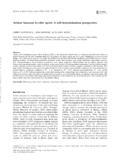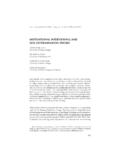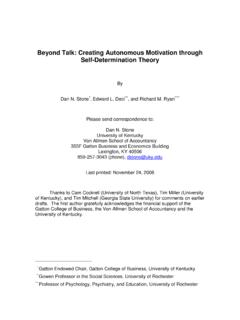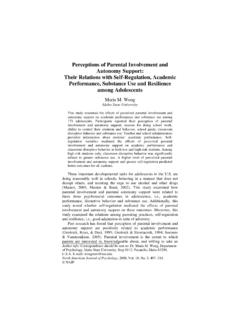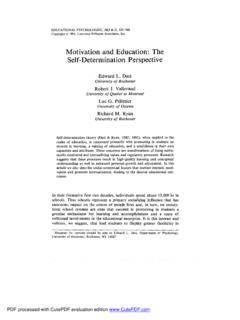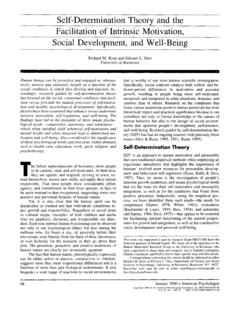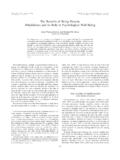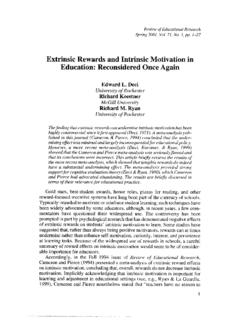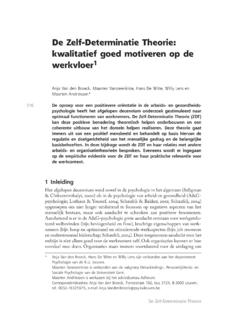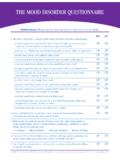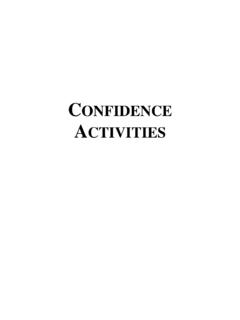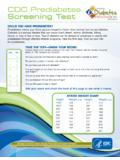Transcription of The Influence of Parenting Styles, Achievement …
1 The Influence of Parenting styles , Achievement motivation , andSelf-Efficacy on Academic Performance in College StudentsErlanger A. TurnerMegan ChandlerRobert W. HefferJournal of College Student Development, Volume 50, Number3, May/June 2009, pp. 337-346 (Article)Published by The Johns Hopkins University PressFor additional information about this article Access Provided by University of Rochester at 12/14/11 3:48PM y/Ju n e 2009 v o l 50 n o 3 337 The Influence of Parenting styles , Achievement motivation , and self -Efficacy on Academic Performance in College StudentsErlanger A. Turner Megan Chandler Robert W. HefferParenting styles have consistently been shown to relate to various outcomes such as youth psycho pathology, behavior problems, and aca demic performance.
2 Building on the research in the Parenting style literature, along with examining components of self determination theory, the pre sent study examined the relations among authoritative Parenting style, academic per formance, self efficacy, and Achievement motiva tion using a sample of college students (N = 264). Results indicated that authoritative Parenting continues to Influence the academic performance of college students, and both intrinsic motivation and self efficacy predicted academic performance. Additionally, the study tested the interaction between self efficacy and authoritative Parenting , but the interaction was not significant. Implications for future research and applications are styles and techniques have con sis tently been shown to relate to various outcomes such as child psychological problems ( , aggression) and academic performance (Baumrind, 1967, 1991; Dornbusch, Ritter, Leiderman, Roberts, & Fraleigh, 1987; Querido, Warner, & Eyberg, 2002).
3 Several conceptualizations of Parenting styles or characteristics have been delineated. Most have focused on quantities and qualities of warmth, responsiveness, and control in the Parenting repertoire ( , Coolahan, McWayne, & Fantuzzo, 2002). The majority of published studies on Parenting styles have used some variation of the Parenting style construct delineated by Baumrind (1966, 1967). Baumrind (1966) has identified three Parenting styles : authoritative, permissive, and authoritarian. Authoritative Parenting is characterized by high levels of nurturance, involvement, sensitivity, reasoning, and encour agement of autonomy. Parents who direct the activities and decisions for their children through reasoning and discipline would be described as authoritative.
4 Conversely, permissive Parenting is characterized by making few demands, exhibiting noncontrolling behaviors, and using minimal punishment. For example, parents who do not establish rules and guidelines for their child s behavior would be described as possessing a permissive Parenting style. Authoritarian Parenting tends to fall at the other end of the continuum. Parents characterized as authoritarian exhibit highly directive behaviors, high levels of restriction and rejection behaviors, and power asserting behaviors. These parents tend to have a philosophy that it s my way or the highway. A plethora of research exists building on the work of Baumrind (1966; , Baumrind, 1991; Dornbusch et al.)
5 , 1987; Querido et al., 2002; Strage & Brandt, 1999). In general, an authoritative Parenting style emphasizing both responsiveness and demandingness appears superior in fostering higher academic performance (Reitman, Rhode, Hupp, & Altobello, 2002). Parenting styles and academic performance have been studied primarily in Erlanger A. Turner is a doctoral student of Psychology at Texas A&M University. Megan Chandler is a doctoral student of Psychology at The University of Akron. Robert W. Heffer is a Clinical Associate Professor of Psychology at Texas A&M Journal of College Student DevelopmentTurner, Chandler, & Hefferchildren and adolescents. In several studies ( , Baumrind, 1991; Baumrind & Black, 1967), Baumrind has reported on the positive associations between authoritative Parenting style and academic performance.
6 For example, Baumrind (1991) found that children (ages 4 15 years old) of parents who were characterized as authoritative were the most motivated, the most competent, and the most Achievement oriented. In addition, Baumrind and Black (1967) found that authoritative Parenting was positively associated with academic performance; and authoritarian and permissive Parenting was negatively associated with grades. This relation between authoritative par ent ing style and academic performance in children has been found across ethnic groups. However, some research has shown that this relation does not exist for Hispanic Americans and African Americans ( , Dornbusch et al.)
7 , 1987; Park & Bauer, 2002). Further examination across ethnic groups have found that among African Americans, Parenting style was not a significant predictor of grades (Dornbusch, Ritter, & Steinberg, 1991). In one study using a sample of African American adolescents (11 19 years old), Attaway and Hafer Bry (2004) found that parental beliefs in high degrees of control predicted lower grades, but parental beliefs in responsiveness did not contribute to adolescents grades. Regarding associations between Parenting style and Asian Americans, Parenting styles may not have the same Influence as generally seen in other ethnic/racial groups. Asian American parents are often described as controlling or authoritarian, and these Parenting behaviors have typically been found to predict poor academic Achievement ( , Attaway & Hafer Bry; Baumrind & Black, 1967; Chao, 1994).
8 Given these findings one would expect Asian American children to be less academically successful, but that is often not the case. Asian Americans generally show better academic per for mance than do their counterparts (Peng & Wright, 1994). Some have stated that Asian American parents view parental control as a more organizational type of control that fosters smooth family functioning and harmony (Chao, 2001). Although the effects of Parenting styles have been shown to be inconsistent across ethnic groups, research has generally found a positive relationship between authoritative Parenting and academic performance ( , Baumrind, 1991, Ingoldby, Schvaneveldt, Supple, & Bush, 2003).
9 Over the past few years, the relationship between Parenting characteristics and academic performance has been examined in college students, but inconsistent results have been found. Strage and Brandt (1999) examined the role of Parenting styles in the lives of college students and found that previous Parenting behaviors continue to be important in the lives of college students as with children and adolescents. They found that the more autonomy, demand, and support parents provided, the more students were confident and persistent academically. In other words, authoritative Parenting was found to continue having an Influence on students academic performance.
10 Conversely, researchers have found that Parenting styles and college stu dents grade point average (GPA) are not related (Joshi, Ferris, Otto, & Regan, 2003). For the complete sample no significant relation was found, but results in a sub sample of European American students found a significant correlation between academic performance ( , GPA) and parental ( , mother and father) strictness and paternal involvement. However, the method in which the study measured Parenting styles was not consistent with Baumrind s (1966) prototypes, and this may have resulted in methodological limitations. In conjunction with the effects of authori tative Parenting on academic performance, students motivation and self efficacy may Ma y/Ju n e 2009 v o l 50 n o 3 339 Parenting styles and Academic Performancealso contribute to academic success.
